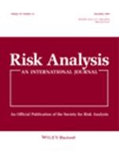
RISK ANALYSIS
Scope & Guideline
Navigating the Complexities of Safety and Risk
Introduction
Aims and Scopes
- Microbial Risk Assessment:
A core focus on assessing the risks posed by microbial pathogens in food, water, and environmental contexts, employing quantitative models to evaluate public health implications. - Environmental and Health Risks:
Investigating risks linked to environmental factors and their impact on human health, including the assessment of water quality and the transmission of zoonotic diseases. - Food Safety and Security:
Analyzing risks associated with food production and consumption, including the effectiveness of interventions and control measures to mitigate foodborne illnesses. - Statistical and Predictive Modeling:
Utilizing advanced statistical techniques and predictive modeling to forecast the behavior of pathogens and assess risk factors in various scenarios. - One Health Approach:
Adopting a multidisciplinary approach that recognizes the interconnectedness of human, animal, and environmental health in risk assessments.
Trending and Emerging
- Impact of Climate Change on Risk:
Increasing focus on how climate change affects microbial risks and food safety, highlighting the need for adaptive strategies in risk assessment. - Use of Machine Learning and AI:
A growing trend towards employing machine learning and artificial intelligence in risk assessment methodologies, enhancing the predictive capabilities of models and improving data analysis. - Interdisciplinary Approaches:
Emerging themes are emphasizing interdisciplinary collaborations that integrate insights from microbiology, epidemiology, environmental science, and public health to create more holistic risk assessments. - SARS-CoV-2 and Viral Pathogen Studies:
A significant increase in research related to viral pathogens, particularly SARS-CoV-2, reflecting the ongoing global health crisis and the need for effective risk management strategies. - Food Safety Innovations:
Emerging focus on innovative food safety measures, including the use of biosensors and advanced imaging techniques for real-time risk assessment in food processing and handling.
Declining or Waning
- Traditional Pathogen Studies:
While studies on specific pathogens continue, there is a noticeable decline in traditional, isolated studies focusing solely on individual pathogens without considering broader ecological or health contexts. - Non-Quantitative Risk Assessments:
There appears to be a waning interest in purely qualitative risk assessments, as the trend shifts towards more quantitative and data-driven approaches that provide clearer, actionable insights. - Localized Risk Assessments:
Research that focuses narrowly on localized risk assessments without integrating broader epidemiological data or regional trends is becoming less common, as there is a greater push for global perspectives.
Similar Journals

JOURNAL OF FOOD PROTECTION
Driving excellence in food protection science.JOURNAL OF FOOD PROTECTION is a prominent academic journal published by Elsevier, dedicated to the field of Food Science and Microbiology. With an ISSN of 0362-028X and an E-ISSN of 1944-9097, it serves as a vital resource for researchers, professionals, and students interested in the microbiological aspects of food safety and quality. Since its inception, the journal has evolved significantly, with coverage spanning from 1977 to the present, reflecting its long-standing commitment to advancing knowledge in this critical area. Recognized for its rigorous peer-reviewed research, the journal boasts a commendable impact factor and ranks in the second quartile in Food Science and the third quartile in Microbiology according to 2023 assessments. Its Scopus ranking also highlights its relevance, with significant placements in both Agricultural and Biological Sciences and Immunology and Microbiology. The JOURNAL OF FOOD PROTECTION is an essential platform for disseminating pioneering studies that address contemporary challenges facing the food industry and public health, making it an indispensable resource in the quest for food safety and innovation.

Mycotoxin Research
Connecting Science and Safety in Mycotoxin StudiesMycotoxin Research, published by Springer Heidelberg, is a vital interdisciplinary journal dedicated to the exploration and study of mycotoxins, their impacts on health and environment, as well as strategies for mitigation. With a solid presence in the fields of Biotechnology, Microbiology, and Toxicology, it has earned a respectable Q3 ranking and continues to facilitate the dissemination of impactful research from 1985 through to 2024. The journal caters to a diverse audience, including researchers, professionals, and students, providing a platform for original research articles, reviews, and case studies that contribute to the understanding and management of mycotoxins. Although it does not offer open-access options, the journal remains a critical resource, engaging its readers with cutting-edge findings and advancements that shape the future of health and safety regarding mycotoxin exposure. With Scopus rankings reflecting its relevance—44th in Toxicology, 113th in Biotechnology, and 71st in Microbiology—Mycotoxin Research stands as an essential publication for anyone dedicated to advancing knowledge in these critical scientific domains.
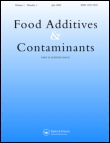
Food Additives & Contaminants Part B-Surveillance
Innovating the discourse on food health and safety.Food Additives & Contaminants Part B-Surveillance, published by Taylor & Francis Ltd, is a premier journal dedicated to the rigorous analysis and surveillance of food additives and contaminants. With an ISSN of 1939-3210 and an E-ISSN of 1939-3229, this journal caters to a global audience, addressing crucial issues in the fields of Food Science, Public Health, and Toxicology. Recognized for its substantial contribution to these areas, it holds a Q2 ranking in both Food Science and Public Health, demonstrating its influence and relevance with an increasing audience within the scientific community. The journal publishes critical research from 2008 onwards and continues its commitment to advancing knowledge up to 2024. Ideal for researchers, practitioners, and students, Food Additives & Contaminants Part B-Surveillance serves as a vital platform for sharing innovative findings and fostering discussions that promote food safety and public health.

INTERNATIONAL JOURNAL OF RISK & SAFETY IN MEDICINE
Pioneering knowledge in medical risk assessment.INTERNATIONAL JOURNAL OF RISK & SAFETY IN MEDICINE, published by IOS Press, serves as an essential platform for advancing the understanding of risk and safety within the medical domain. With an ISSN of 0924-6479 and E-ISSN of 1878-6847, this journal has been dedicated to fostering critical discourse since its inception in 1990, reflecting a continuous commitment to the field through 2024. Positioned within the Q4 category in Health Policy and Q3 in Medicine (miscellaneous) and Public Health, Environmental and Occupational Health, the journal provides valuable insights, empirical research, and theoretical analyses that speak to the diverse challenges faced in medical safety and risk management. Although it operates under a subscription model, the journal remains a vital resource for researchers, healthcare professionals, and students alike, facilitating the exchange of innovative ideas and best practices in health risk assessment. With Scopus ranks indicating its role as a key contributor in its categories, the INTERNATIONAL JOURNAL OF RISK & SAFETY IN MEDICINE continues to shape the landscape of medical safety and policy discussions around the globe.
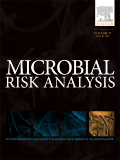
Microbial Risk Analysis
Pioneering Research in Microbial Risk AssessmentMicrobial Risk Analysis, published by Elsevier, is a pivotal academic journal specializing in the intersection of epidemiology, infectious diseases, and medical microbiology. With an ISSN of 2352-3522 and an E-ISSN of 2352-3530, this journal has been contributing to the field since its inception in 2016 and continues to invite groundbreaking research as it converges through 2024. With a respectable impact factor, Microbial Risk Analysis holds a Q3 designation in key categories, showcasing its credibility with ranks such as #48 in Epidemiology and #124 in Infectious Diseases according to Scopus. The journal serves as an essential platform for researchers, professionals, and students alike, aiming to enhance understanding of microbial risks and their public health implications. Although it operates under a subscription model, its contents remain accessible to a broad range of interdisciplinary scholars dedicated to advancing microbial research. For those at the forefront of epidemiological and infectious disease studies, Microbial Risk Analysis represents a crucial resource for disseminating knowledge and fostering collaboration.
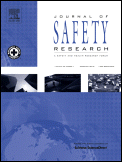
JOURNAL OF SAFETY RESEARCH
Championing excellence in safety research since 1969.The JOURNAL OF SAFETY RESEARCH, published by Pergamon-Elsevier Science Ltd, stands as a premier platform for scholarly discourse within the domain of safety, risk, reliability, and quality. With an esteemed impact factor and a strong ranking of #38 out of 207 in its category as per Scopus, this journal maintains a distinguished Q1 quartile status, reflecting its influence and significance in advancing safety research since its inception in 1969. Researchers, practitioners, and students alike will find a wealth of knowledge here as the journal explores critical aspects of safety in various contexts, highlighting innovative strategies and empirical findings that contribute to improved safety outcomes globally. Though it operates under a traditional access format, the journal’s extensive repository of articles ensures that vital information remains accessible to its readership. The JOURNAL OF SAFETY RESEARCH is not only a cornerstone for those within the safety engineering field, but also a vital resource for professionals seeking to enhance their understanding of risk management and quality assurance methodologies.

Food Additives and Contaminants Part A-Chemistry Analysis Control Exposure & Risk Assessment
Elevating standards in food science and toxicology.Food Additives and Contaminants Part A-Chemistry Analysis Control Exposure & Risk Assessment, published by Taylor & Francis Ltd, is a leading journal in the field of food science, toxicology, and public health. With an ISSN of 1944-0049 and an E-ISSN of 1944-0057, this esteemed publication has established itself as a vital resource for researchers and professionals involved in the analysis and regulation of food additives and contaminants. Since its inception and through its converged years from 2008 to 2012 and again from 2014 to 2023, the journal has maintained an impactful presence, notably achieving a Q2 ranking in diverse categories including Chemistry (miscellaneous) and Food Science, alongside commendable standings in Health and Environmental Health. The journal’s mission is to foster high-quality research by providing a platform for critical studies related to chemical analysis, exposure assessments, and risk management in food safety. By prioritizing engaging, peer-reviewed content, it aims to enhance understanding and mitigate risks associated with food additives, making it an indispensable tool for academics, practitioners, and policymakers alike.
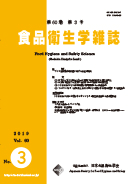
Food Hygiene and Safety Science
Advancing Global Food Safety StandardsFood Hygiene and Safety Science is a pivotal academic journal published in Japan by the esteemed FOOD HYGIENE & SAFETY. With its ISSN 0015-6426, this journal operates within the broad domains of food science, public health, and medicine, strategically addressing the critical issues surrounding food hygiene and safety. With a notable history spanning from 1960 to 2024, it has become an essential resource in these fields, currently holding a Q3 category ranking in Food Science as well as in Medicine (Miscellaneous) and Public Health, Environmental and Occupational Health, according to the 2023 evaluations. Although access options may vary, the journal is committed to disseminating vital research findings to enhance food safety practices on a global scale. With its focus on advancing knowledge and sharing innovative practices, Food Hygiene and Safety Science serves as a vital platform for researchers, professionals, and students dedicated to improving food safety standards and public health outcomes.
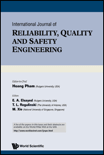
International Journal of Reliability Quality and Safety Engineering
Championing Reliability and Safety in Engineering DisciplinesThe International Journal of Reliability Quality and Safety Engineering, published by World Scientific Publishing Co Pte Ltd, is a leading platform for disseminating cutting-edge research in the fields of reliability, quality, and safety engineering. With an impressive scope that spans across aerospace, electrical engineering, nuclear energy, and industrial manufacturing, this journal serves as a critical resource for researchers and professionals aiming to enhance system dependability and operational excellence. Indexed in Scopus, it holds a respectable Q3 ranking across various categories in 2023, reflecting its growing influence in the academic community. Although currently not open access, it provides ample opportunities for scholars to publish impactful studies from its extensive database, which has evolved since 1996. The journal's commitment to advancing knowledge in reliability and safety engineering makes it a pivotal resource for those dedicated to improving engineering practices and protocols worldwide.
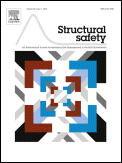
STRUCTURAL SAFETY
Advancing safety in structural engineering.STRUCTURAL SAFETY is a premier journal dedicated to advancing the field of engineering with a focus on safety, risk, reliability, and quality in structural analysis and design. Published by Elsevier, this esteemed journal boasts an impressive Impact Factor and ranks in the top quartiles (Q1) of key categories including Building and Construction, Civil and Structural Engineering, and Safety, Risk, Reliability, and Quality. With a significant history spanning from 1982 to 2024, STRUCTURAL SAFETY fosters scholarly exchange among researchers, professionals, and students by publishing innovative and high-quality research articles that contribute to the safety and resilience of engineered structures. The journal operates without open access barriers, ensuring a broad audience can access invaluable insights in the engineering realm. Its distinguished Scopus rankings further underscore its impactful role within the academic community, making it an essential resource for anyone invested in the discipline of structural safety.